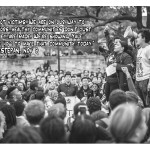by Jorge Lema
“I feel that smart kids are dedicated to school and do not have the same personality as me,” my sister Stefany told me.
For years, my parents and I questioned why Stefany chose to attend the High School of Telecommunication Arts and Technology (Tele, a zone school) while I attended a prestigious magnet school. We wondered why she refused to take the New York City Specialized High School entrance exam (SHSAT). Without it, she would not be able to attend a school like mine.
There are nine specialized high schools in New York City. Students need to score high enough on an exam to gain admission. I barely passed the SHSAT to attend Brooklyn Technical High School, a prestigious magnet school. The student body was 60% Asian American, 20% white, 8% Black, and 8% Hispanic. At that point, I had been the only Latinx in the advanced placement class in middle school.
I regarded this 8% as a blessing. It was an opportunity to bond with individuals who were not only like me in terms of their academic ambition, but who also looked like me. My sister viewed this 8% with horror. The 56% Latinx population at Tele was much more attractive.
For Stefany, attending Brooklyn Tech, or any specialized high school, required a trade-off: giving up her identity as a Latina to study at a school where she found it difficult to connect with students who “spoke smart” and did not understand her culture. In addition, she didn’t believe she could even make it into Brooklyn Tech.
To her, intelligence is measured by how much you read, how informed you are about politics, or by the way you spoke. These were qualities that she never identified with or defined herself by.
Now, at Tele, Stefany’s friends marvel at how privileged she is. We have a house, three cars, two parents, a dog, beds to sleep on, and a space where a family of four can live comfortably. Many of her friends have family members in jail, are adopted or in foster care, have never met their biological parents, or share a two-bedroom studio apartment with their family of six.
At her school, the privilege of living in a home where mom and dad are still together belongs to the elite. The pinnacle of this privilege, in their eyes, is that Stefany has a brother who goes to Yale.
My sister is looked down upon for choosing to attend a school which is predominately Latino. This school is underfunded, hires teachers who expect failure from certain students, and does not produce academically successful student machines the way that Brooklyn Tech does.
I’m not sure the fact that she would feel uncomfortable at a school like Brooklyn Tech justifies her choice. Stefany’s decision to surround herself with people who are like her may have had a detrimental effect on her future. I know she will be successful, but that does not hide the fact that she might have to work twice as hard as I did to find resources that will aid her on her journey to a place like Yale.
Her friends question why she chose to attend school with them. They wonder how a Yalie could have a sister at Tele. I find myself asking the same thing. Yalies are not low income, first generation, Latino American, from Sunset Park, or Tele students with family members in jail. In their eyes, Yalies fit a different mold.
Yes, my family lives in a home – but in the basement of that home. Yes, we have three cars – but they are a taxi, a van, and a 16ft truck – essential to the labor work that my father does in the city. I also have two parents and, for that, I am blessed. I would be nowhere without them. I would be nowhere without the resources that Brooklyn Tech provided.
I would not be at Yale without the internship through the Alumni office, the guidance counselor who became my friend, teachers who pushed me to get involved in extracurricular activities, and faculty who advised me on the college process. My sister won’t get that at Tele.
I would have never made it to Yale had I not conformed to the system. My minority status in all of my classes since the sixth grade eased the transition into Brooklyn Tech. It also diminished the desire to choose a school based on a demographic with which I identified. I took AP classes and I often represented Latinos through my performance. I dealt with the “dirty Mexican” or “does your father mow a lawn for a living?” jokes as I assimilated into Brooklyn Tech culture as well as the New York City education system.
This is a system that discriminates against people of color and only advances students that accept an exam as the sole determinant of their value. It’s a system that works for students of color only if they show potential for success, without providing help them or guidance. This is a system that says I am good enough, but my sister is not.
An institutional divide exists within my home. Stefany is questioned for wasting an opportunity to study in one of New York City’s best high schools. Our ideologies paved these contrasting roads. I chose to go through the system. I just wanted to succeed – for mom and dad. Stefany, however, chose not to play the game. Her identity overpowered her desire for conventional success.
I am now at Yale. My sister isn’t and I worry about how she’ll get here. I want to push her to conform to the system, so that we both gain access to resources that otherwise won’t be available. But I want her to be true to herself. I hope universities don’t dismiss her application because of where she studies or how she took advantage of resources “available” at her school.
Stefany, I promise to serve as a mentor. One that looks like you and lives with you. My privilege as a Yale student will aid you on your road to success.



